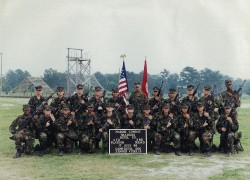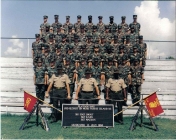ASSISTANT SQUAD LEADER: Performs duties as the assistant squad leader of a smoke/decontamination squad in the Army's only airborne chemical company; responsible for the health, welfare, discipline, and professional development of seven paratroopers; responsible for the maintenance and accountability of squad equipment consisting of three M56 smoke generators systems, three M17 Lightweight Decontamination Systems, three 125 GPM pumps, and two LMTV's valued at over $850,000 dollars.
ASSISTANT TEAM LEADER: Team Leader in a Biological Integrated Detection System (BIDS) Company; responsible for the supervision, combat training, morale, discipline, health, and welfare of three soldiers; responsible for the utilization and maintenance of one biological detection suites, one M1097A2 HMMWVs, one M998 HMMWVs, one M101A2 trailers, one 15kw generator set plus associated weapons and equipment valued over $1.5 million.
CBRN NCO: Serves as a team sergeant or CBRN NCO; the commanders technical advisor on all CBRN operations; as a first responder, advises the commander on HAZMAT operations and environmental issues at the awareness and operator level; conducts and supervises detection, identification, decontamination, reconnaissance, surveillance, survey and monitor operations, and obscurant (smoke and field-flame expedient operations) processes associated with all aspects of CBRN defense; conducts sensitive site exploitation, mitigation, escort and remediation processes of CBRN devices or hazards; performs sampling, chain of custody, and evidence preservation procedures of CBRN and environmental hazards; maintains monthly CBRN defense equipment (CDE) status reports; coordinates with units Training NCO/Officer to implement yearly CBRN training requirements IAW units METL; prepares and evaluates CBRN training; maintains annual records of CBRN training; supervises, trains, and certifies Soldiers on CBRN tasks; maintains hand receipts, schedules training, and assigns specific duties of subordinates; supervises maintenance on CBRN and varied equipment to include associated vehicle maintenance.
Non-Chemical Company CBRN NCO - responsible for planning and conducting CBRN defense training, provides technical advice on all CBRN operations and hazards to the Battalion/Company Commander.
SQUAD LEADER: Performs duties as the assistant squad leader of a smoke/decontamination squad in the Army's only airborne chemical company; responsible for the health, welfare, discipline, and professional development of seven paratroopers; responsible for the maintenance and accountability of squad equipment consisting of three M56 smoke generators systems, three M17 Lightweight Decontamination Systems, three 125 GPM pumps, and two LMTV's valued at over $850,000 dollars.
TEAM LEADER: Team Leader in a Biological Integrated Detection System (BIDS) Company; responsible for the supervision, combat training, morale, discipline, health, and welfare of three soldiers; responsible for the utilization and maintenance of one biological detection suites, one M1097A2 HMMWVs, one M998 HMMWVs, one M101A2 trailers, one 15kw generator set plus associated weapons and equipment valued over $1.5 million.
OPERATIONS SERGEANT: Serves as a detachment sergeant, platoon sergeant, senior team leader, operations sergeant, or CBRN NCO; serves as a CBRN advisor at the battalion level or higher (except for separate brigades) or Squadron CBRN advisor in headquarters not authorized a chemical branch officer; the commanders technical advisor on all CBRN operations; as a first responder, advises the commander on HAZMAT operations and environmental issues at the awareness, operator, and technician level; conducts and supervises detection, identification, decontamination, reconnaissance, surveillance, survey and monitor operations, and obscurant (smoke and field-flame expedient operations) processes associated with all aspects of CBRN defense; conducts sensitive site exploitation, mitigation, escort and remediation processes of CBRN devices or hazards; performs sampling, chain of custody, and evidence preservation procedures of CBRN and environmental hazards; coordinates inspections for unit CBRN rooms to ensure readiness; consolidates and maintains monthly CBRN defense equipment (CDE) status reports; coordinates with units Training NCO/Officer to implement yearly CBRN training requirements IAW units METL; prepares and evaluates CBRN training; maintains annual records of battalions CBRN training; supervises, trains and certifies Soldiers on CBRN tasks; maintains hand receipts, schedules training, and assigns specific duties of subordinates; supervises maintenance on CBRN and varied equipment to include associated vehicle maintenance.
DETACHMENT NCO: Serves as a detachment sergeant, platoon sergeant, senior team leader, operations sergeant, or CBRN NCO; serves as a CBRN advisor at the battalion level or higher (except for separate brigades) or Squadron CBRN advisor in headquarters not authorized a chemical branch officer; the commanders technical advisor on all CBRN operations; as a first responder, advises the commander on HAZMAT operations and environmental issues at the awareness, operator, and technician level; conducts and supervises detection, identification, decontamination, reconnaissance, surveillance, survey and monitor operations, and obscurant (smoke and field-flame expedient operations) processes associated with all aspects of CBRN defense; conducts sensitive site exploitation, mitigation, escort and remediation processes of CBRN devices or hazards; performs sampling, chain of custody, and evidence preservation procedures of CBRN and environmental hazards; coordinates inspections for unit CBRN rooms to ensure readiness; consolidates and maintains monthly CBRN defense equipment (CDE) status reports; coordinates with units Training NCO/Officer to implement yearly CBRN training requirements IAW units METL; prepares and evaluates CBRN training; maintains annual records of battalions CBRN training; supervises, trains and certifies Soldiers on CBRN tasks; maintains hand receipts, schedules training, and assigns specific duties of subordinates; supervises maintenance on CBRN and varied equipment to include associated vehicle maintenance.
Platoon Sergeant - Responsible for the training, welfare, readiness, and professional development of 20 soldiers in the concept of detection, sampling and identification and marking of BNC contamination; supervises maintenance and accountability of six M93A1 Nuclear Biological Chemical Reconnaissance Systems (FOX) and associated equipment in excess of $18 million.
SECTION LEADER: Responsible for planning and conducting CBRN defense training, provides technical advice on all CBRN operations and hazards to the Division/Brigade and Group Commanders.
74D50 - Skill Level Five
OPERATIONS SERGEANT: Serves as a detachment sergeant, platoon sergeant, senior team leader, operations sergeant, or CBRN NCO; serves as a CBRN advisor at the battalion level or higher (except for separate brigades) or Squadron CBRN advisor in headquarters not authorized a chemical branch officer; the commanders technical advisor on all CBRN operations; as a first responder, advises the commander on HAZMAT operations and environmental issues at the awareness, operator, and technician level; conducts and supervises detection, identification, decontamination, reconnaissance, surveillance, survey and monitor operations, and obscurant (smoke and field-flame expedient operations) processes associated with all aspects of CBRN defense; conducts sensitive site exploitation, mitigation, escort and remediation processes of CBRN devices or hazards; performs sampling, chain of custody, and evidence preservation procedures of CBRN and environmental hazards; coordinates inspections for unit CBRN rooms to ensure readiness; consolidates and maintains monthly CBRN defense equipment (CDE) status reports; coordinates with units Training NCO/Officer to implement yearly CBRN training requirements IAW units METL; prepares and evaluates CBRN training; maintains annual records of battalions CBRN training; supervises, trains and certifies Soldiers on CBRN tasks; maintains hand receipts, schedules training, and assigns specific duties of subordinates; supervises maintenance on CBRN and varied equipment to include associated vehicle maintenance.
DETACHMENT SERGEANT: Serves as a detachment sergeant, platoon sergeant, senior team leader, operations sergeant, or CBRN NCO; serves as a CBRN advisor at the battalion level or higher (except for separate brigades) or Squadron CBRN advisor in headquarters not authorized a chemical branch officer; the commanders technical advisor on all CBRN operations; as a first responder, advises the commander on HAZMAT operations and environmental issues at the awareness, operator, and technician level; conducts and supervises detection, identification, decontamination, reconnaissance, surveillance, survey and monitor operations, and obscurant (smoke and field-flame expedient operations) processes associated with all aspects of CBRN defense; conducts sensitive site exploitation, mitigation, escort and remediation processes of CBRN devices or hazards; performs sampling, chain of custody, and evidence preservation procedures of CBRN and environmental hazards; coordinates inspections for unit CBRN rooms to ensure readiness; consolidates and maintains monthly CBRN defense equipment (CDE) status reports; coordinates with units Training NCO/Officer to implement yearly CBRN training requirements IAW units METL; prepares and evaluates CBRN training; maintains annual records of battalions CBRN training; supervises, trains and certifies Soldiers on CBRN tasks; maintains hand receipts, schedules training, and assigns specific duties of subordinates; supervises maintenance on CBRN and varied equipment to include associated vehicle maintenance.
Course Title: CBRN SPECIALIST
Course: 494-74D10 Phase: Course Length: 10 Weeks 0.0 Days
Verifiable Prerequisites
PULHES 122221 Required
Normal Red/Green (RG) Perception YES Required
Physical Demand Rating VERY HEAVY - LIFT OCCASIONAL OVER 100 LB, FREQUENT 50 LB Required
Course Security Clearance Y - NONE Required
Prerequisite Courses
There are no Prerequisite Courses.
Text Prerequisites
Qualifying scores.
(a) A minimum score of 95 in aptitude area ST in Armed Services Vocational Aptitude Battery (ASVAB) tests administered prior to 2 January 2002.
(b) A minimum score of 92 in aptitude area ST on ASVAB tests administered on and after 2 January 2002.
Active Army or Reserve Component enlisted personnel. The completion of Chemical Decontamination Training Facility training (CDTFT) is a requirement for graduation. Completion of CDTFT may be waived for temporary medical cause. The USACMLS will recommend to Commander, U.S. Army Training Brigade that a waiver of training be approved for AIT soldiers who are unable to complete training due to medical restrictions or equipment fit or failure. AIT soldiers who refuse to participate in training or unsatisfactorily complete the training following a second attempt will be processed in accordance with current IET reclassification/elimination procedures. Allied students may train at the CDTFT. All students attending the course must bring their medical records to the installation. Personnel required to wear optical inserts IAW AR 40-63 must bring one set to the installation. Students must arrive at the installation with a valid DA Form 348 (Equipment Operator's Qualification Record) complete with Battery II scores. Students arriving without DA Form 348 may be held in the reception battalion until Battery II testing is complete and DA Form 349 is issued. Active component personnel (all grades): For initial award of MOS, Soldiers must attend resident training at the U.S. Army Chemical School (USACMLS) where they will be exposed, while wearing CBRN protective wear, to toxic agents in the chemical defense training facility. No other course will be the basis for MOS qualification. ARNG/USAR personnel (all grades): National Guard and Army Reserve Soldiers will attend the resident course at USACLMS or at a TASS Battalion. SECURITY: None
Course Scope:
Provide a logical progression in transitioning a civilian into a soldier by presenting individual skills and task selected to develop a well-disciplined, motivated soldier proficient in common entry level tasks. To develop self-discipline, motivation, physical readiness, and proficiency in combat survivability techniques and individual weapons that will enable the soldier to become a productive member of the U.S. Army Chemical Corps. To provide training in tasks necessary to perform decontamination and smoke generator operation. Also provided are the skills and knowledge needed to perform duties in a decontamination platoon or section authorized Power Driven Decontamination Equipment. The soldier will also be trained to perform smoke generator operator and fuel supply tasks in a platoon. Training will include operation and operator level maintenance of NBC survey and decontamination equipment, operation and maintenance of assigned smoke equipment, decontamination operations, smoke operations, detection/identification operations, as well as required general military subjects to support SL1 specific tasks.
Special Information:
There is no Special Information.




